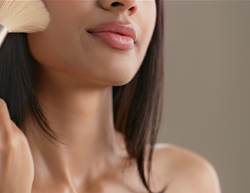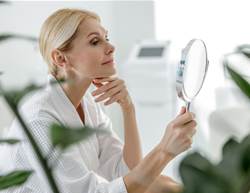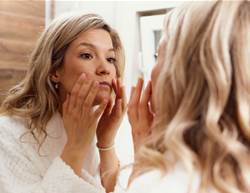About 10-15% of Australians live with eczema, a condition that makes skin red, inflamed and sometimes unbearably itchy. Thought to be caused by an overactive immune system, the triggers of eczema can be endless—from stress and hormonal changes to ingredients in certain soaps and perfumes. And once your eczema starts to rage, getting it to stop can be tough.
While topical steroids sometimes help, they come with plenty of side effects (like thinning skin, stretch marks and discoloration). Luckily, there are a wide range of other solutions that work just as well or even better. Read on to hear how 7 serious eczema sufferers finally found relief.
White vinegar soak
“If my eczema flare-up is on my legs, I’ll pour a cup of white vinegar in a lukewarm tub of water and soak for about 15-20 minutes. If my face is affected, I’ll soak a washcloth in lukewarm water and vinegar and press it to my face several times. Either way, I follow up with lotion or cream. A dermatologist told me about using vinegar when I was first diagnosed with eczema, and I’ve continued the practice because it always takes the itch away.” —Conchetta, 57
A careful regimen
“People who've never had eczema don't truly understand the emotional impact it can have. But I haven't had a flare-up in two years, thanks to a regimen I created: Every day, I apply virgin coconut oil to my entire body, and every 3 to 4 days I use a 2in1 Dandruff Shampoo Plus Conditioner as a body wash. [It contains the active ingredient pyrithione zinc.] Now my confidence is better than ever, and I can do simple things like go to the beach without fear of embarrassment.” —Jonathan, 39
The right moisturiser
“Without a proper skincare routine, my skin can easily become super-dry to the point of scaling and cracking—especially during the winter! My biggest tip is to keep your skin hydrated. But be mindful of the products you use. Just because a moisturiser says it's 'organic' or 'healing,' doesn't mean it will be good for your skin. I make an effort to avoid products with sodium laureth sulfate, witch hazel, alcohol, parabens and those that have 'fragrance' listed high on the ingredients list.” —Michael, 25
A special wrap
“My sons and I all get eczema, and it's really bad on our elbows. Last year, I discovered 'wet therapy,' which involves applying a lotion followed by a special 'sleeve' wrap, and then you wet the sleeve with cold water to make it damp. I was very skeptical, but the results were amazing! I tried it on myself and my sons before bed, and within 5 days our eczema was gone. Nothing else we've tried has ever worked, not even creams that were prescribed by their pediatrician.” —Shannon, 43
Catching rays
“After giving birth to my son (who’s almost 4), then my daughter (almost 2), I had disastrous-looking eczema on my legs. I couldn't wear skirts or shorts without major stares, or someone asking ‘What's wrong with your legs?’ I hate to say it, but the only thing that worked was using tanning booth for 5 minutes, 3 days a week. When I was inside the booth, I covered my face and body with towels and only exposed my legs—and my rashes vanished almost completely within 6 weeks. When I confessed this to my doctor, she nodded her head and told me it was OK as long as I didn't stay in it too long, and that UV exposure often helps eczema. Spending time in the sun outdoors works too, but you might have to stay out in the rays a bit longer. To keep the results up, I also smear my legs with a thick layer of moisturiser at least once a day.” —Suzanne, 39
Bleach bath
“I know it sounds crazy, but when I have a particularly bad flare-up, a bleach bath helps. My dermatologist recommended it. I use a half-cup of household bleach for a full tub of water or one-quarter cup for a half tub. I soak up to 10 minutes, then rinse off. I also go for weekly excimer laser treatments. They help reduce itchiness and get rid of scarring.” —Monica, 25
A trigger-free diet
“Most of my eczema results from my many food allergies. Gluten, tomatoes, sweet potatoes, and other foods trigger rashes and lesions for me, so I now avoid them. Soaps with perfume also irritate my skin and cause eczema, so I use very mild soaps that have no fragrance. Also, if I swim in chlorinated water, my eczema flares up, so I swim in lakes and pools that don't use chlorine." —Janet, 68










